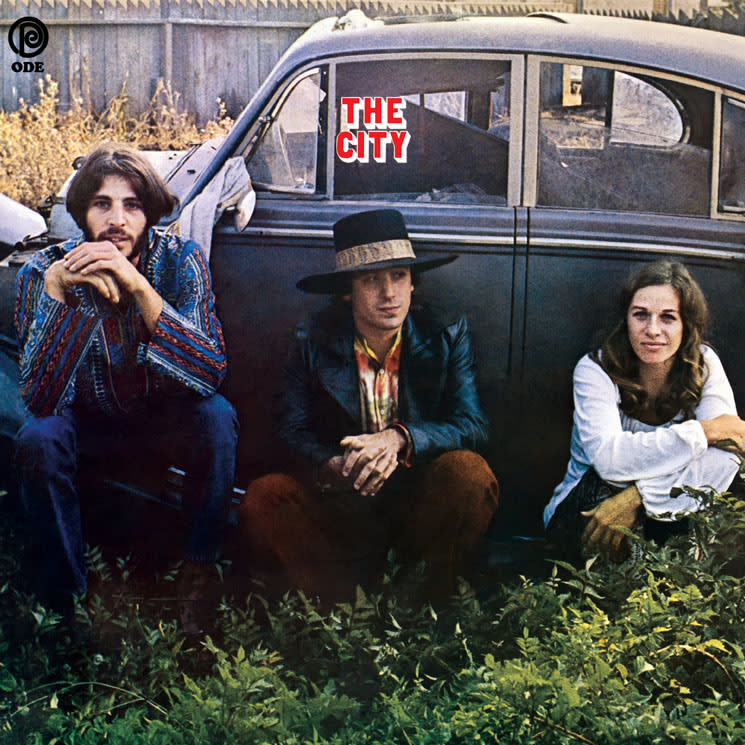For everyone but her most ardent fans, Carole King's career can be split neatly into two separate periods: first, there was Carole King, hit maker extraordinaire for the Shirelles ("Will You Love Me Tomorrow"), Little Eva ("The Loco-Motion"), the Drifters ("Up On the Roof") or Aretha Franklin ("[You Make Me Feel Like] A Natural Woman"); then, she became Carole King, singer-songwriter and auteur of the epochal, genre-defining Tapestry. The real story, as it is often the case, is not quite so simple.
Following her split with husband and co-writer Gerry Goffin and a move to California, King, then 26, was ready to transition from songwriter to performer, but not yet ready to embrace the spotlight as a solo artist. Thus, the City was born. Some of the songs on 1968's Now That Everything's Been Said are familiar: "I Wasn't Born to Follow" appears as rollicking, cosmic country-rock on The Notorious Byrds Brothers and "That Old Sweet Roll (Hi-De-Ho)" became a horns-driven rock'n'soul Top 20 hit two years later for Blood, Sweat & Tears. The names in the credits are familiar, too: in addition to session drummer Jim Gordon, King is joined here by guitarist Danny "Kootch" Kortchmar, bassist Charles Larkey and producer Lou Adler — the three would go on to form the core of the supporting cast on King's most celebrated recordings.
Still, there is something different about Now That Everything's Been Said. Make no mistake about it: the songwriting lives up to King's lofty standards, starting with the lush, sophisticated "Snow Queen" and the Laura Nyro-like title song, complete with overlapping cascades of multi-tracked vocals. The gorgeous, gospel-infused piano licks that would become a prominent element of King's sound are also present, most notably on "Lady," "Why Are You Leaving" and the aforementioned "…(Hi-De-Ho)."
While it quickly becomes abundantly clear that King is in the driver's seat, the album still shows her somewhat self-consciously trying to function within the parameters of a group: she shares the microphone with Kortchmar on "I Don't Believe It" as well as "My Sweet Home," and the guitarist takes a (mostly) solo turn on "Man Without A Dream." Kortchmar is a passable vocalist, but these moments feel most conspicuously like attempts by King to shy away from centre stage.
Out of print for more than a decade, Now That Everything's Been Said has been impeccably remastered by Dave Cooley and now sounds at once warmer and more detailed than ever. If not quite a buried treasure, the City's lone album is much more than a curiosity for the hardcore — it captures a turning point in King's career, but it also marks the tentative emergence of a voice and the birth of a sound that would both come to dominate the first half of the 1970s.
(Light In The Attic)Following her split with husband and co-writer Gerry Goffin and a move to California, King, then 26, was ready to transition from songwriter to performer, but not yet ready to embrace the spotlight as a solo artist. Thus, the City was born. Some of the songs on 1968's Now That Everything's Been Said are familiar: "I Wasn't Born to Follow" appears as rollicking, cosmic country-rock on The Notorious Byrds Brothers and "That Old Sweet Roll (Hi-De-Ho)" became a horns-driven rock'n'soul Top 20 hit two years later for Blood, Sweat & Tears. The names in the credits are familiar, too: in addition to session drummer Jim Gordon, King is joined here by guitarist Danny "Kootch" Kortchmar, bassist Charles Larkey and producer Lou Adler — the three would go on to form the core of the supporting cast on King's most celebrated recordings.
Still, there is something different about Now That Everything's Been Said. Make no mistake about it: the songwriting lives up to King's lofty standards, starting with the lush, sophisticated "Snow Queen" and the Laura Nyro-like title song, complete with overlapping cascades of multi-tracked vocals. The gorgeous, gospel-infused piano licks that would become a prominent element of King's sound are also present, most notably on "Lady," "Why Are You Leaving" and the aforementioned "…(Hi-De-Ho)."
While it quickly becomes abundantly clear that King is in the driver's seat, the album still shows her somewhat self-consciously trying to function within the parameters of a group: she shares the microphone with Kortchmar on "I Don't Believe It" as well as "My Sweet Home," and the guitarist takes a (mostly) solo turn on "Man Without A Dream." Kortchmar is a passable vocalist, but these moments feel most conspicuously like attempts by King to shy away from centre stage.
Out of print for more than a decade, Now That Everything's Been Said has been impeccably remastered by Dave Cooley and now sounds at once warmer and more detailed than ever. If not quite a buried treasure, the City's lone album is much more than a curiosity for the hardcore — it captures a turning point in King's career, but it also marks the tentative emergence of a voice and the birth of a sound that would both come to dominate the first half of the 1970s.
